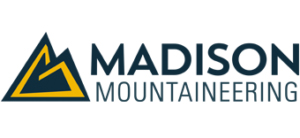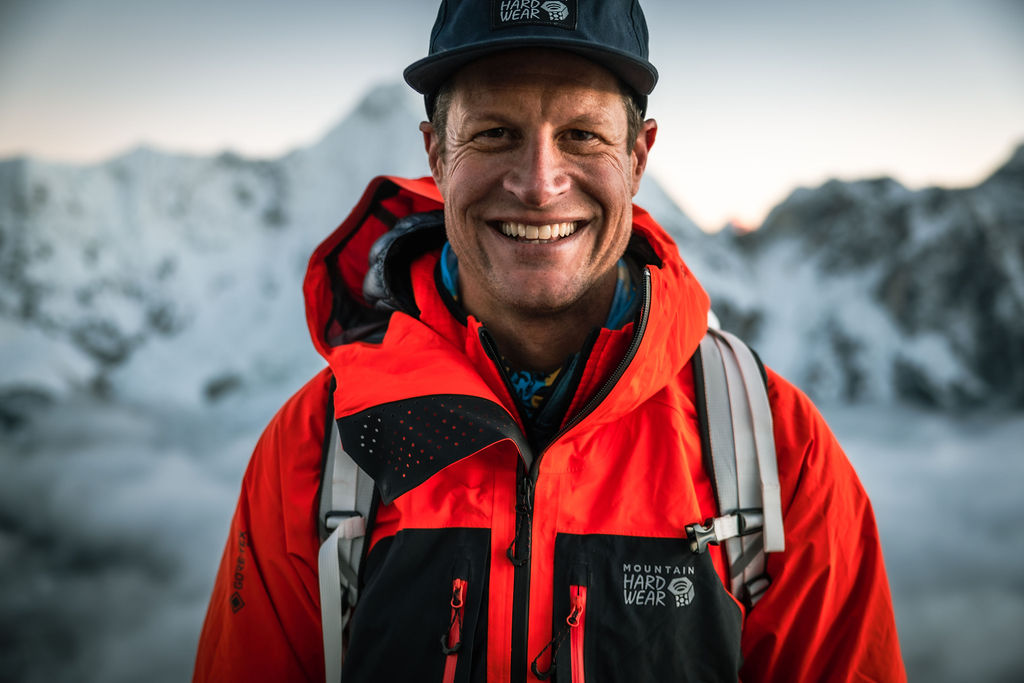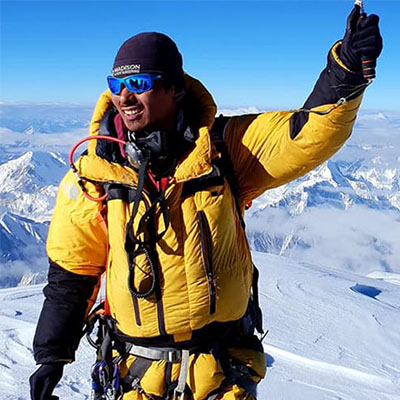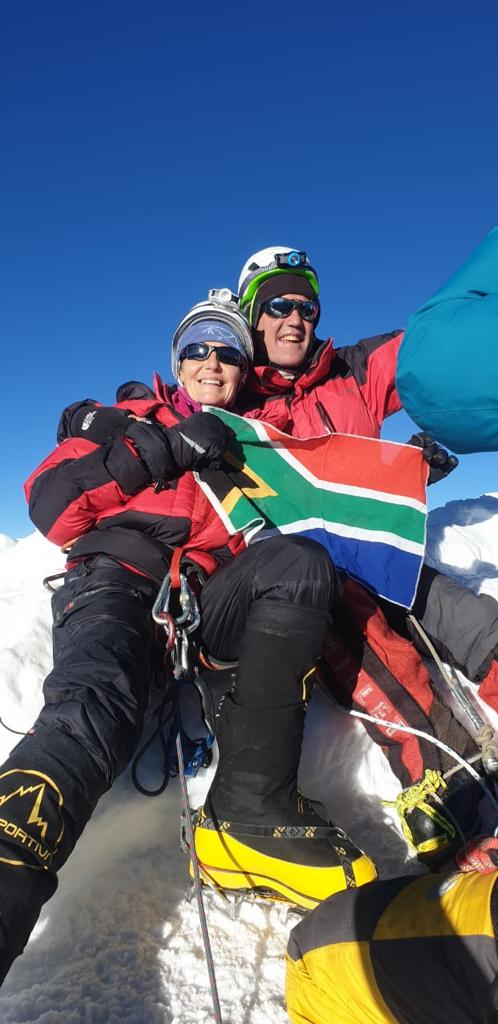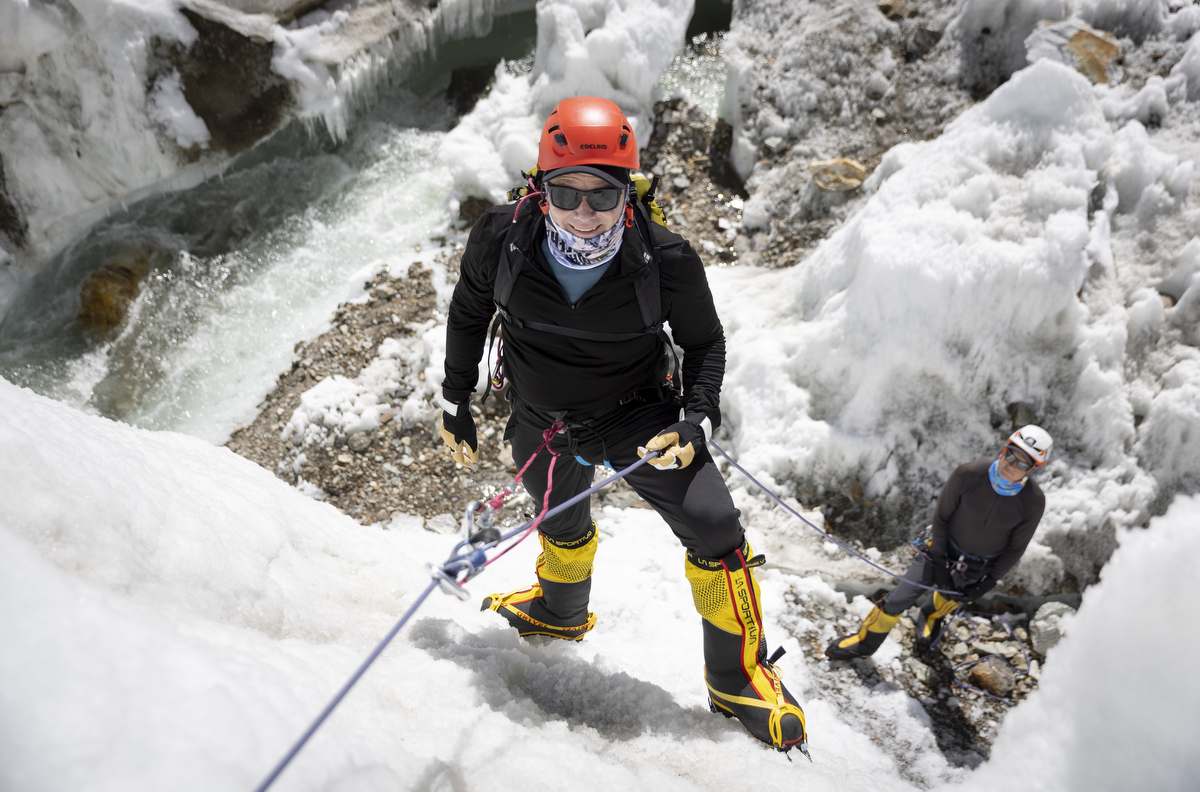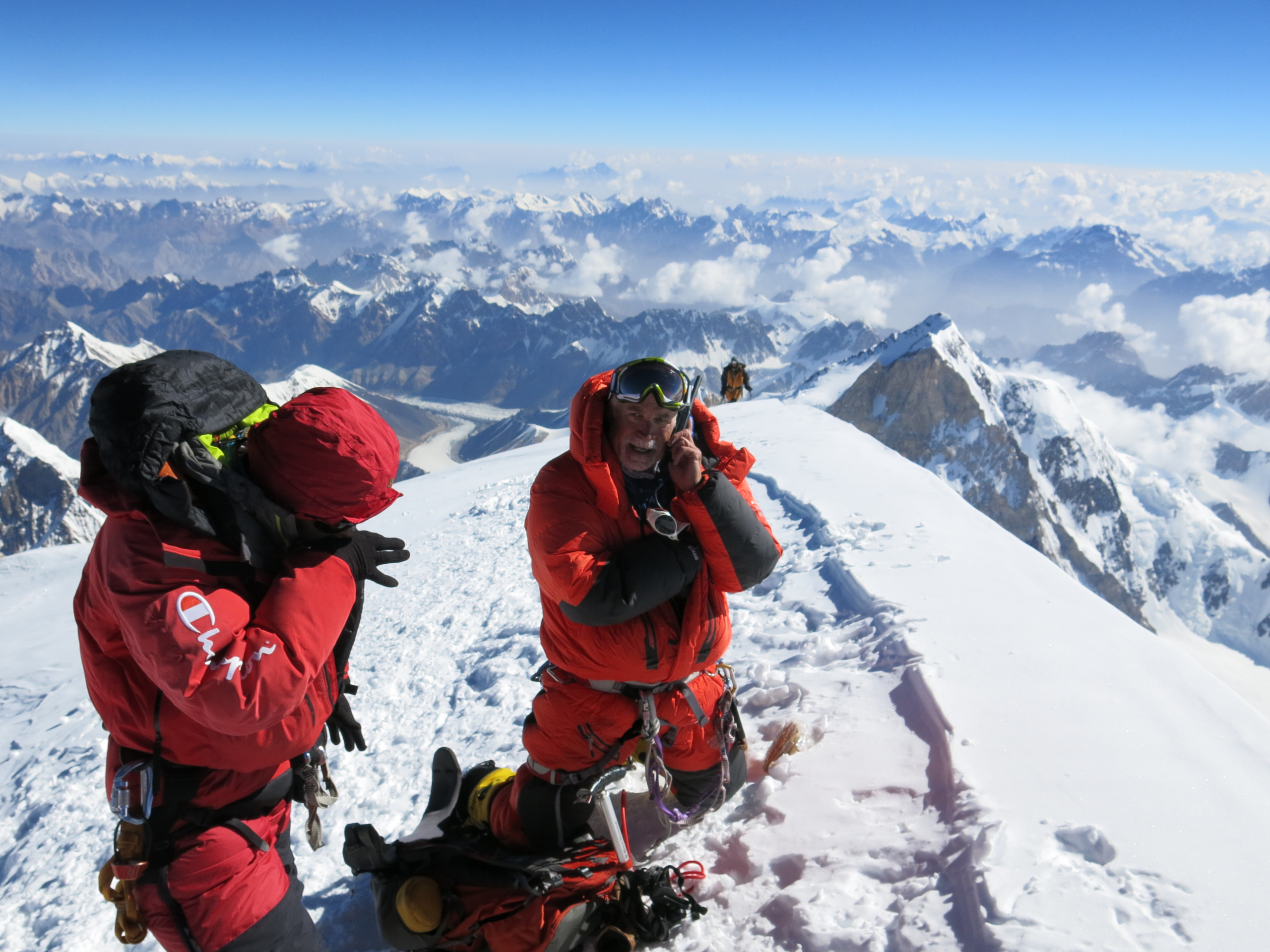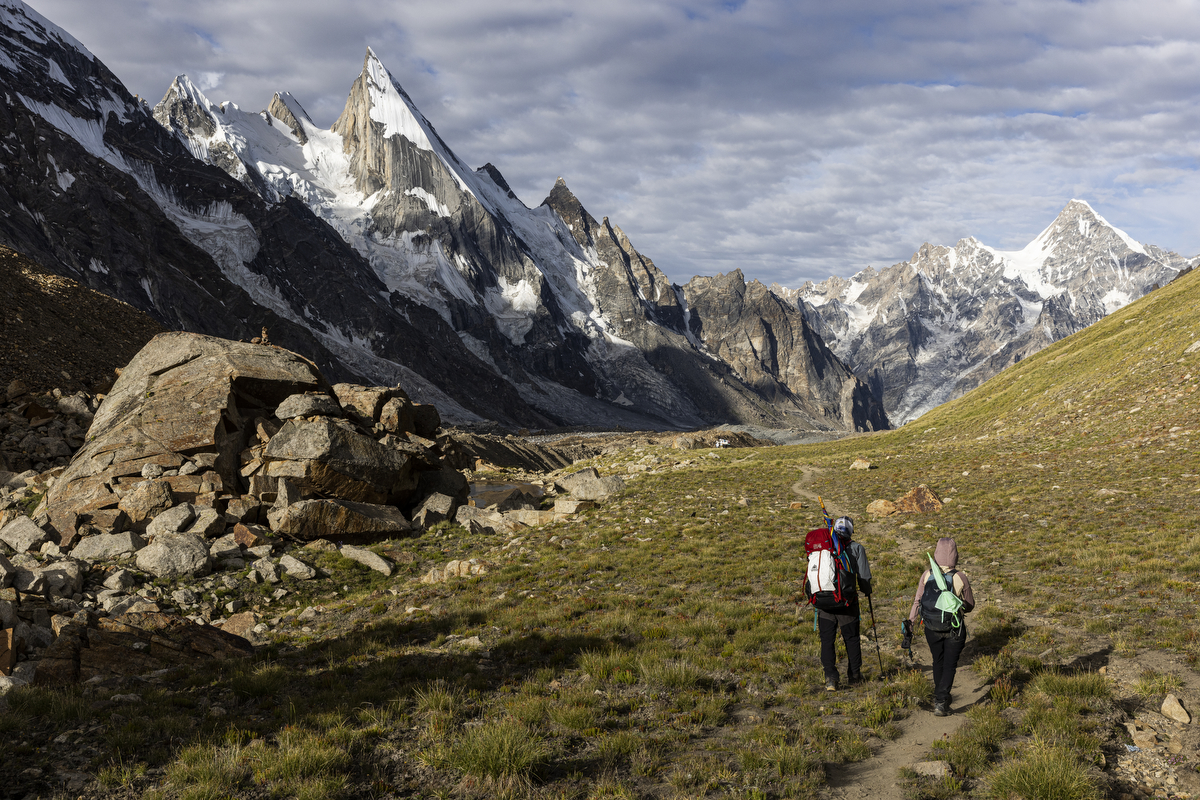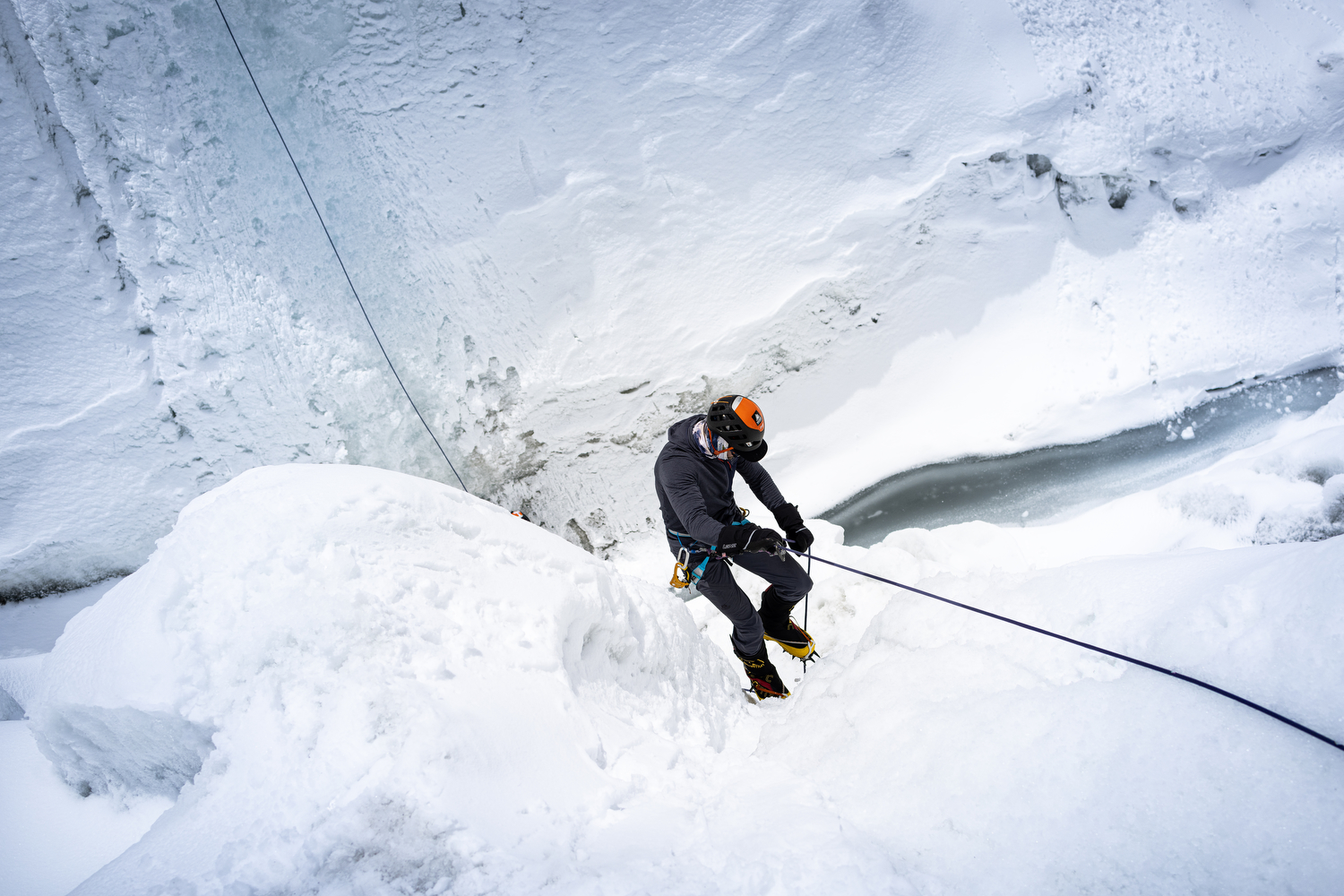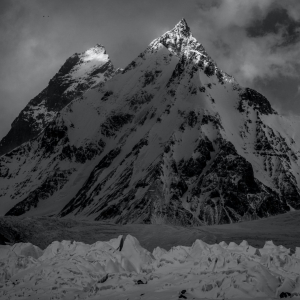Climbing K2 is much more challenging and far more dangerous than climbing Everest via the standard North or Southside routes, and for this reason, we plan to keep our team size small and comprised of qualified climbers, supported by some of the best climbing Sherpas and mountain guides in the world. Unlike on Everest, because the weather and route conditions are notoriously fickle on K2, we must be prepared to take advantage of very brief periods of good weather. Rockfall and snow avalanches are common on the route following K2’s Abruzzi ridge, making it often unsafe to climb or camp (as evidenced by the 2013 tragedy), and the monolithic ice cliff which overhangs the “bottleneck” and “traverse” portions of the route on summit day sheds ice frequently (as evidenced by the 2008 tragedy), so taking advantage of good route conditions and moving quickly are paramount.
8000-meter peaks such as Everest, Cho Oyu, and Manaslu are now frequented by commercial operators coordinating together to set the fixed ropes, therefore sharing this workload, however since K2 is undeveloped we will likely be working alone or with only one other team to set the fixed lines. Additionally, relying on support from other teams for help is not available so we must be self-sufficient throughout.
Unfortunately, the food available in Pakistan is not the best for foreigners, so we have developed a meal plan that encompasses the entire trek and climb. Most of this food is brought from the USA, and we have a Nepalese cook who we have worked with for many years who (with his staff) meticulously prepares each meal for our team. On the mountain, our guides and Sherpas help prepare the meals. We find that climbers perform much better, and are often in better spirits when the food is appetizing and nutritious.
We employ many porters to ferry our expedition loads to base camp. The trek to K2 base camp is more than twice the distance as the trek to Everest base camp (south side) and is considerably more arduous being mostly on glacier and loose rock. There are no villages or lodges (as on the Everest trek) so we must transport our entire camp kit by porters each day as we move our caravan towards base camp. Each porter on hire requires an additional porter to carry food and personal items, so we have a small army making our way up and down the Baltoro Glacier. It is very important to differentiate ourselves from other operators in that we have a very nice base camp, with large common tents with heating for dining and communications, and comfortable personal tents for each member. Being here for almost 2 months, it is important for our team to have a comfortable camp, as well as to have access to the internet via a satellite modem (this cost is free to all members). We have modern VHF radios for communications on the mountain, and each member is issued their own radio. We also have satellite phones available to members.
We have regular access to hot showers, sinks for washing multiple times daily, one sanitary toilet tent for men and one for women, as well as ample space for storing your personal equipment securely.
Above base camp (16,300’) we have 5 camps: Advanced Base Camp (17,400’), Camp 1 (19,900’), Camp 2 (21,980’), Camp 3 (23,800), and Camp 4 (25,300’). Unlike many teams who share tents in various camps, we have our own dedicated tents in each camp that are preset to reserve our space at the beginning of the season. One should note that at Camp 1 and Camp 2 there is only space for 6-8 tents maximum, so if you arrive late in the season you must share a tent with another team that already has their camp established if you wish to use that camp. Much of the route leading up to Camp 4 is on steep snow or ice slopes, however, there is also significant rock. Portions of the route such as House’s Chimney and The Black Pyramid involve sustained periods of vertical rock climbing, so one should be well versed using crampons on steep rock at high altitude.
Our plan is to climb partway up the route reaching Camp 3 to acclimatize before making our summit rotation. For details regarding our acclimatization and Oxygen strategy please contact our office.
On summit day we begin the gradual ascent of “the Shoulder” on hard snow and ice leading up to the bottleneck, a rock and snow climb under the looming Serac. Next is the “Traverse” which is mostly front pointing, and then the upper snow slopes leading to K2’s summit, where we are often breaking trail through knee-deep snow. The view from the top is amazing!
- Itinerary
- Dates and Costs
- Gear List
- Why Madison Mountaineering?
Day 1: Arrive in Islamabad.
Day 2: Fly via fixed-wing aircraft from Islamabad to Skardu. Explore the village and relax in the gardens of the hotel overlooking the Indus River
Day 3: Rest day in Skardu, organize equipment, and prepare for the drive to Jhola/Paiju camp
Day 4: Drive to Jhola/Paiju camp in jeeps
Day 5: Rest day in Paiju (3305m/10,906ft)
Day 6: Trek to Urdukas (4130m/13,630ft)
Day 7: Trek to Goro 2 (4250m/14,025ft)
Day 8: Trek to Concordia (4600m/15,180ft)
Day 9: Arrive K2 base camp (5650m/18,650ft)
Days 10-15: Rest days & training in base camp.
Days 16-36: Climbing period. We make at least one rotation climbing up to Camps 1, 2 and 3 before making our summit attempt. During this time, we establish our route and high camps and evaluate the weather for our summit rotation.
Day 37: Organize gear for departure, begin trekking to Goro 2
Day 38: Trek from Goro 2 to Urdukas
Day 39: Trek from Urdukas to Paiju
Day 40: Drive from Paiju to Skardu by jeep
Day 41: Fly Skardu to Islamabad
Day 42: Depart Islamabad for home country
Days 42+: Contingency days to account for delays due to weather, route conditions, etc.
As with any complex mountaineering expedition the itinerary is likely and subject to change.
K2 Abruzzi Ridge Route
- June 24 – August 4, 2026
Deposit: USD 25,000
Costs include:
- Airport pick up in Islamabad
- 2 nights accommodations in Islamabad at 4 star hotel, 1 night before and 1 night after the expedition. (If additional nights in Islamabad are required climbers must pick up the extra nights)
- Welcome dinner in Islamabad, breakfast included with hotel stay (2 nights)
- Tents during the trek and climb. At base camp each climber will have a 3 person tent at base camp for personal use. We will have a private dining tent for our expedition, and a private communications tent for our expedition. A toilet tent and shower tents will also be provided exclusive to our team, as well as lights, heaters, and a power source for recharging your electronics
- All food during the climb. No expense is spared in providing high quality food from the USA and Pakistan/Nepal. If you have particular dietary requirements, please give us specific details and we will accommodate your needs!
- All transportation in Pakistan, including round-trip flights from Islamabad to Skardu & Skardu to Islamabad. In the event these flights are cancelled we will usually wait a few days for another flight before making the 2 day journey by bus to Skardu
- All group equipment needed to climb the mountain: ropes, tents, cooking gear, fuel, stoves, all forms of rock, ice, and snow protection, VHF radios for all members, other communication gear, plenty of oxygen for all climbers & Sherpas, oxygen mask & regulator, medical supplies, etc.
- Internet access & satellite phones in base camp. Satellite phone is available at $3 per minute
- Professional weather forecasting services from USA & European based meteorologists
- Sherpa, porters, liaison officer, camp staff and guides
- All administration fees owed to Islamabad, including climbing permits
Costs do not include:
- Bank Wire Transfer Fees (if applicable)
- International round-trip airfare (USA-Pakistan-USA)
- Meals in Islamabad and extra hotel nights after the climb (once the climber has left the mountain). If we are delayed in Islamabad climbers must pay for additional nights
- Personal gear for any standard 8000-meter peak expedition, clothing and sleeping equipment (see gear list)
- Insurance. A comprehensive medical insurance policy is required to embark on this expedition. An evacuation Insurance Policy is also mandatory. Helicopter evacuation from base camp is available and very expensive
- Trip cancellation insurance. This is highly recommended
- Comprehensive medical exam. A physician signed Medical Release Form is required
- Alcoholic beverages and bottled drinks
- All expenses incurred in the event of early departure (evacuation fees, transport, extra hotel nights, etc.)
- Personal Items
- Charges incurred as a result of delays beyond the control of Madison Mountaineering
- Personal communication (phone, fax, e-mail) between Pakistan and home country
- Gratuities ($1000 Sherpa summit bonus for your personal Sherpa). Western guide gratuity
- Option to depart base camp by helicopter
Cancellation/Refund Policy
- There are no refunds for the deposit or balance payments for this expedition. This includes but is not limited to, expeditions that conclude without reaching or making progress towards expedition objective(s) (for example, the summit) due to route conditions, weather, insufficient manpower, or any other factor outside the control of Madison Mountaineering.
- Expedition leader has the final say on the expedition conclusion and will make all best efforts towards reaching expedition objective(s) within our margin of safety.
- Participants that choose to leave an active expedition for any reason are not entitled to any refunds
- Madison Mountaineering, LLC highly recommends trip cancellation insurance for all expeditions
- Due to the nature and heavy costs of government and operator permits, Madison Mountaineering must adhere to a stringent refund policy
- Deposit due with registration materials
- All balances are due 120 days prior to departure date unless otherwise specified
- Participants whose balances are not received by the 120-day deadline as stated above, risk forfeiture of their funds and their place on the expedition
Note: Madison Mountaineering, LLC reserves the right to waive any fees. As we offer personalized service, we will attempt to accommodate changes and cancellations when necessary, waiving certain fees when feasible. Deposits paid by participants acknowledge the above cancellation terms.
Base Layers
- Synthetic Short Underwear (2-3 pair): non-cotton style underwear
- Lightweight Long Underwear (2-3 pair): long sleeve shirt and long pants
- Heavyweight Long Underwear (1 pair)
- Short Sleeve Synthetic Shirt (1-2 pair)
Mid Layer
- Soft Shell Jacket: to be worn over other layers
- Soft Shell Pants: very breathable and water repellant
- Lightweight Nylon Pants (1-2 pair)
Waterproof/Rain Layers
- Hard Shell Jacket with hood: waterproof and breathable shell jacket
- Hard Shell Pants: waterproof and breathable shell pants
Insulation Layers
- Heavyweight Insulated Down Jacket with hood: we primarily wear this when climbing below Camp 2
- Insulated Pants: worn primarily when climbing below Camp 2
- Down Suit: worn when climbing above Camp 2
Headwear
- Warm Hat: synthetic or wool hat (ski hat)
- Balaclava: to protect your neck and face in high winds
- Baseball Cap or other sun hat: to shade your face/neck from the sun on a hot day
- Bandana or Buff: to protect your neck/face from the sun
Eyewear
- Glacier Glasses: full protection with side covers or wrap around
- Ski Goggles: to be worn on summit day in the event of high winds – (2nd pair optional)
Gloves
- Lightweight Synthetic Base Layer Gloves: for wearing on a hot day
- Soft Shell Gloves: to wear for moderate cold/wind
- Shell Glove with Insulated Liner: to wear for severe cold/strong wind
- Expedition Mitts: large enough to fit a liner glove inside
- Heated Gloves (optional): Battery-powered heated gloves
Footwear
- Liner Socks (3 pairs)
- Wool or Synthetic Socks (6 pairs)
- Heated Socks (optional)
- Mountaineering boots
- Hiking Boots/Shoes: comfortable, sturdy boots or shoes for the trek to base camp
- Camp boots: comfortable boots for wearing in camp
- Gaiters (optional)
- Booties (optional)
Sleeping Equipment
- Sleeping Bag (for high camps): rated to at least -40°F. Goose down or synthetic
- Sleeping Bag (for base camp): rated to at least -20°F
- Self-inflating Sleeping Pads (2): full length is preferred, 1 for base camp and 1 for high camps
- Closed-cell Foam Pad: to be used in conjunction with the inflating pad for warmth and comfort when sleeping
- Earplugs
Mountaineering Gear
- Expedition Backpack: approximately 105L
- Compression Stuff Sacks: for reducing the volume of the sleeping bag, down parka, etc., in your pack
- Trash Compactor Bags: to line backpack and stuff sacks as well as for separating gear
- Backpack Rain Cover (optional)
- Trekking Backpack: to carry on the trek to base camp. Simple and light.
- Trekking Poles with Snow Baskets: adjustable poles
- Ice Axe: general mountaineering tool (65cm)
- Crampons: general mountaineering crampons
- Climbing Helmet: must be able to fit over your warm hat
- Ascender: 1 right or left-hand ascender
- Accessory Cord: 30 feet (9m) of 6mm accessory cord
- Alpine Climbing Harness: mountaineering harness, with adjustable leg loops. Not a rock-climbing “sport” harness
- Carabineers: 3 regular and 3 locking
- Carabineer for progression lanyard
- Belay/Rappel device
- Headlamp: with 2 extra sets of new batteries
- Pack Liner (2 pieces)
Travel Items
- Large Duffel Bags with Locks (2): for transporting gear
- Carry-on Backpack: can use trekking backpack, approximately 18” x 16” x 10” (46cm x 41cm x 26cm)
- Travel Clothes: for days in cities and towns
- Lightweight journal, sketchbook, pencils, pen
- U.S. cash: for currency exchange to purchase SIM cards or merchandise in cities and villages
Additional Food Items
- Snack Food: bring a few days’ supply of your favorite climbing snack food such as bars, gels, nuts, beef jerky, etc.
variety of salty and sweet is good
Other Equipment
- Cup: plastic 16 oz. minimum cup or mug
- Bowl: large plastic bowl for eating dinner or breakfast
- Spoon: plastic spoon (Lexan)
- Water Bottles (2 or 3): wide mouth bottles with 1-liter capacity
- Water Bottle Parkas (2): fully insulated with zip opening
- Water Treatment (optional): UV-based or tablets
- Thermos: 1 liter
- Heated Insoles (optional): battery powered for your boots
- Hand Warmers
- Sunscreen: SPF 50 or better
- Lip Screen (2 sticks): SPF 30 or better
- Toiletry Bag: include toilet paper and hand sanitizer
- Pee bottle: 1-liter minimum bottle for convenience at night in the tent
- Female Urination Device (FUD)
- Knife or Multi-tool (optional)
- Small Personal First-aid Kit: include athletic tape, band-aids, Ibuprofen, blister care, cough drops, etc.
- Medications and Prescriptions: bring antibiotics (Azithromycin, etc.), and altitude medicine such as Diamox and dexamethasone
- Handkerchiefs/Bandanas (optional)
Optional Electronics
- Country-appropriate power plug adapters and power transformers
- Avalanche Transceiver
- Adventure Sports Watch: such as Garmin fēnix 6
- GPS/Personal Satellite Communicator: such as Garmin inReach Mini
- Personal Power System: such as Goal Zero Nomad 28 Plus Solar Panel and Sherpa 100AC Power Bank
- Digital Entertainment: movies, tv shows, music, books loaded on to smartphone, iPad, Kindle
- Camera: bring extra batteries, charger, and memory cards
- Portable Travel Humidifier: battery powered
Madison Mountaineering is recognized for well thought out strategy in leading high altitude climbing expeditions, as well as high-quality service throughout. We have two decades of experience in the planning and coordination of mountaineering expeditions, our reputation is excellent. We strive to make each expedition the best possible experience for our climbers and focus on our 3 primary goals of success in reaching the summit, returning safely, and having fun! Safety is always our number one priority.
Our guides are some of the best and most experienced in the industry, having a strong grasp of technical climbing, expedition, and high altitude experience, along with strong interpersonal skills. Our teams are small and equipped with the best support available to ensure the highest chance of success. We are renowned for our comfortable base camps, high-quality food, first-rate communications, and medical support services, all of which are overseen by a professional member of our team.
Most of our climbers have either climbed with us before, been referred by a friend who has climbed with us, or met one of our teams while attempting another peak and decided to join us for their next expedition. We work hard to facilitate safe, successful, and enjoyable expeditions for all of our climbers. Our track record and past climber testimonials prove we are highly competent experts in our field and love what we do!
